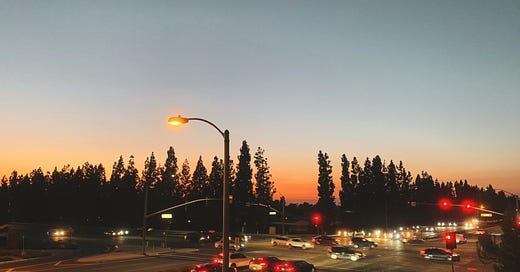There are certain things about me, I know, that scream eldest daughter. I try to be aware of this, so as to recognize the instances when I think I see a Societal Phenomenon that are really just a reflection of my own slowly-becoming-my-father journey.
This kind of self-awareness, by the way, is a curse. A little prison.
However. This, I think, is real: people no longer know where they're going. I'm talking physically. I’m talking geographically.
I notice it more and more as time goes on, and it's starting to freak me out: without the help of a phone in their hands, people moving about their own cities and towns have no idea how to get from point A to point B, even if points A and B are frequently visited. And it's not that they're trying to figure it out, either—no. They're quite happy letting their phone dictate their everyday routes.
It makes me want to shove a large, unwieldy, haphazardly-folded map into everyone’s hands.
Take last week, when I was walking from one neighborhood to another with someone—west-east. I like knowing in which direction I'm headed, something I understand is not for everyone. Sure. I’ll grant you that. But (and this, admittedly, is the boomer in me coming out), I think everyone should possess a basic mental layout of wherever they call home. It's a safety issue, a peace of mind issue, a work-your-brain issue.
I like to orient myself in a place. Makes me feel well-planted.
The person I was walking with last week had no idea where we were at any given point, despite us walking through a fairly central and well-trodden part of the city, and despite them having lived here for over two years. They confused one major arterial road for another. This, which I first assumed was a joke, boggled my mind. "I'll let you navigate" is fine and well when you're traveling somewhere new with someone more acquainted with a map's finer points, but in your own city? How, actually, can you ever manage to feel at home if you’re reliant on your phone to get you everywhere and anywhere?
And I know we talk too much already about people becoming dumber and embracing anti-intellectualism, but this happy surrender I keep seeing from so many in letting their apps and not their internal navigation systems guide them is actually really concerning to me. People don't know—or care to know—where they live!
*
There used to be more shame involved in the staunch pursuit of ignorance. A cost, if only in degrees of humiliation and danger. Fifteen, maybe twenty years ago, if you didn't know your way somewhere, you had to go on Mapquest before you headed out, and were you not lucky enough to have a co-pilot to bully next to you, you either half-memorized the directions or risked your life to sneak a glance down at the crumpled sheets you'd printed before getting in the car. If you were walking, you could carry a giant, look-at-me map, or ask someone for directions.
Eventually, through trial and error, you'd learn your way and no longer need assistance. A graduation of sorts.
In the case of orientation and a variety of other subjects, our phones have eliminated this trial-and-error phase of learning. And, if you’ll permit me a grand generalization, we’re worse off for it.
I’m not positing that friction belongs everywhere. Anything relating to civil rights, liberties, and civic duties, actually, could do with a lot less friction—voter registration, paying taxes, signing up for health care, attending and memorializing protests. Other things, too: unsubscribing from gyms and email listservs; begging your former school to email you an unofficial transcript without promising them a kidney; bullying our elected representatives into doing their jobs.
In terms of growth and personal development, though, the existence of friction makes one crave knowledge, if only to keep from dying and/or looking stupid in front of strangers, foes, and friends. Lacking a set of skills you’d like to acquire is an obstacle that, should you want to overcome it, presents you with a fairly clear set of instructions. In the case of learning how to get from point A to point B: study a map, memorize the directions, repeat until it becomes second nature. Tedious, perhaps, but simple. If we insist on using GPS every time we go somewhere, without making our brains strain even a tiny bit, we never allow our internal navigation skills to develop. In the naive belief that all we need is the destination, we collapse the journey and lose the skill involved in coursing it.
It’s the same issue, among others, I have with generative AI. The supposed loss of friction makes it much easier to get to a version of the end—an image, a paragraph, a summary—that requires no effort from the so-called creator. But in so directing a software to create it in your stead, you learned nothing about drawing, writing, synthesizing. Coming away with a product without taking part in the process of its creation isn’t a shortcut, not really. It’s a means to dilute your own possibilities, a way to atrophy your muscles before you even had a chance to see what they could do.
*
I’m also not arguing there is no use for GPS. Obviously. While traveling, or headed somewhere in a different part of town, or at rush hour when traffic might, if we’re driving, add a mind-numbing amount of minutes to our commute. But to places we’ve been before? Often? In our immediate or adjacent environs? Why wouldn’t we want to learn the route instead of walking around like goddamn Sims, waiting for a satellite to tell us where to turn next?
Is it not worth implicating more of yourself into your life—your brain as well as your body? Once you know where you're going, you can decide to take a different path. But we're not allowing ourselves even that very basic bit of independence.
And we miss so much when we let our phones dictate where we go. Yes, there’s the impairment of brain capacity and potential loss of grey matter, but also: entire streets that for arbitrary reasons, our apps like to avoid; crowded, cozy restaurants you can jot down as you pass them by; a building that reminds you of a past home. The sense of belonging that only comes from knowing our way around a place.

*
Apologies. I know this is all very back in my day. I’m just worried we’re giving our brains away in the name of convenience. We should want to think. Building sturdy neural pathways should be a goal, not something we try to avoid lest the effort wastes time.
But no one knows where they're going and what’s worse, no one seems to want to know where they're going. They're happy to be walked, like dogs, by their phones. At least dogs look and sniff about as they’re walked. We mostly look down at our screens.
Further reading:
In a prior version of this newsletter, I’d included all the little academic studies within the essay. But honestly, I don’t care that much about the hippocampus of it all. I just want us to know where we’re going because it helps us become part of our environment. However, and please forgive my citation style mishaps:
“Habitual use of GPS negatively impacts spatial memory during self-guided navigation” (Sci Rep (2020))
I thought this finding was quite revealing: “those who used GPS more did not do so because they felt they had a poor sense of direction, suggesting that extensive GPS use led to a decline in spatial memory rather than the other way around.”
“Navigation-related structural change in the hippocampi of taxi drivers” (Proc. Natl. Acad. Sci. (2000).
We’ve all heard of this study, I fear. Unclear when I’ll ever use my knowledge of the system used to train London taxi drivers.
“Safety-first: The risk of over-reliance on technology in navigation” (Journal of Transportation Safety & Security. 2021)
I hadn’t heard of this, actually, but there are a few studies on the potential over-reliance of GPS on marine navigation. Need to do a bit more sleuthing to make sure it’s not veering too much to the conspiracy theory space.
“Towards neuroadaptive navigation assistance to reduce spatial de-skilling” (Cogn Process. 2024)
This study posits the use of updated navigation displays that “support spatial learning without fostering technology dependency.”
“How does navigation system behavior influence human behavior?” (Cogn Res Princ Implic. 2019)
An interesting one, as it deals with pedestrian navigation (I found the majority of studies more concerned with in-car navigation).
“How Do In-Car Navigation Aids Impair Expert Navigators’ Spatial Learning Ability?” (Ann Am Assoc Geogr. (2024)
“Participants with greater dependence on in-car navigation aids performed worse on the spatial knowledge tests. Our combined behavioral and neuropsychological findings provide evidence for the impairment of expert navigators’ spatial learning ability when exposed to long-term use of digital in-car navigation aids.”
Thank you for reading.
You can find me on instagram and tiktok. The newsletter is fully supported by readers, so if you find yourself frequently enjoying these posts, please consider sharing the newsletter with a friend and/or becoming a paid subscriber.
P.S. Liking posts apparently makes a big difference for the ~algorithm~, so if you’ve enjoyed this issue and you’re inclined to hit the little heart, it wouldn’t be remiss!





As a fellow eldest daughter who has been unknowingly becoming her boomer father, I’ve never related more to a rant. People using Google maps to travel 10 blocks and not knowing where they live hurts my heart and my brain.
It's not an option for all of us. Developmental topographical disorientation is a form of neurodivergence in which the brain can't form cognitive maps; it's thought to affect about 2% of the population. I have it (properly diagnosed), as do two of my sisters, while my mum couldn't drive, navigate, give directions or reliably tell left from right. I struggle finding my way back to my table if I go to the loo in a pub or restaurant and often end up in the kitchen, men's, or even outside; driving is very challenging (roundabouts are more or less off limits, and I only drive very locally) and I couldn't draw you a map of the tiny village I've lived in for years. The bit of my brain that's supposed to do these things isn't there and never has been; instead of this developing since satnavs, I can remember being a very small child (six or seven) and realising that something was different about me compared to the way other kids moved about in the world, though I couldn't put words to it. I still move around with a sort of grey blur beyond what I can actually see and while I hide it a lot I'm getting better at admitting it. Mostly, though, it's exhausting (the cognitive load when trying to get around is really high) and it causes a lot of anxiety that can be debilitating.